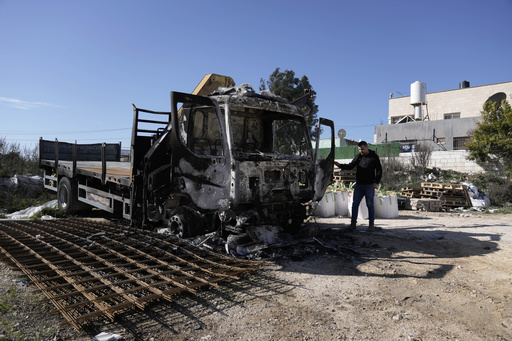
JINSAFUT, West Bank — In the wake of an incident involving suspected Jewish settlers attacking Palestinian villages late Monday, U.S. President Donald Trump announced the cancellation of sanctions against Israelis accused of violent actions in the region. This move reverses measures implemented by the Biden administration aimed at holding radical settlers accountable and may indicate a shift towards a more lenient U.S. policy regarding Israel’s settlement expansion and treatment of Palestinians. During Trump’s earlier administration, he strongly supported Israel and seems to have assembled a team of advisors who similarly back settler interests.
Settler leaders quickly expressed their approval of Trump’s decision, which came as sanctions were originally set in place nearly a year ago amid escalating violence during the Gaza conflict. These sanctions had later been broadened to include a wider range of Israelis identified as radical or violent. Bezalel Smotrich, Finance Minister and a prominent figure among settlers, characterized the sanctions as an unreasonable foreign intervention and praised Trump’s steadfast support for Israel via social media.
Currently, approximately 3 million Palestinians in the West Bank live under what is considered indefinite Israeli military control, with the Palestinian Authority overseeing day-to-day governance in several cities and towns. Leaders such as Smotrich, along with other hard-liners, advocate for the annexation of the West Bank and the re-establishment of settlements in Gaza, territories that were occupied by Israel after the 1967 conflict. Palestinians aim to include these areas in their envisioned future state and regard the settlements as significant barriers to achieving peace. The international community largely deems these settlements to be illegal, with over 500,000 settlers holding Israeli citizenship in the West Bank.
On the same day as the sanctions were lifted, masked men, believed to be settlers, reportedly attacked at least two Palestinian villages, causing damage to homes and businesses as reported by local officials in Jinsafut and Al-Funduq, situated approximately 30 miles north of Jerusalem. The Palestinian Red Crescent attended to 12 individuals who sustained injuries during the assault. The Israeli military reported that these attackers threw stones at soldiers who responded to the conflict and stated that an investigation into the events is underway.
The spate of violence in the West Bank has intensified during the Gaza war, leaving it unclear whether this recent aggression was directly tied to the altering of sanctions. Meanwhile, Israel launched a significant military operation at the Jenin refugee camp on Tuesday. Jalal Bashir, Jinsafut’s village council leader, recounted that the assailants targeted three homes, a nursery, and a carpentry shop located on the village’s primary thoroughfare. The head of Al-Funduq’s local council, Louay Tayem, commented that numerous assailants discharged firearms, threw stones, and set ablaze vehicles along with attacking shops and residences.
Bashir described them as masked individuals equipped with incendiary devices and noted that their numbers had surpassed previous encounters. In Jinsafut, residents surveyed the aftermath of the attack, where burnt vehicles were discarded along the road.
The increasing impunity surrounding such acts of violence has seemingly escalated since Biden’s sanctions were implemented, offering a glimpse into heightened frustrations regarding Israel’s response to radical settlers. Rights organizations assert that the situation has worsened after the Israeli Defense Minister exempted settlers from the practice of administrative detention, commonly applied against Palestinians, which permits detaining individuals without charges or legal proceedings.
Katz, who recently released all Israelis held in administrative detention, stated that those responsible for the recent aggression should face consequences through Israel’s established criminal justice system, while Palestinian residents find themselves subjected to military courts. Initially aimed at addressing violent acts and threats to Palestinian properties, Biden’s sanctions later extended to include organizations like Tzav 9, accused of obstructing humanitarian aid to Gaza.
Reut Ben-Chaim, an activist and mother of eight, whose organization faced sanctions that severely affected her wellness business, appreciated Trump’s recent decision. She expressed her belief that the Trump administration’s actions signal an unprecedented level of pro-Israel engagement.
Though Trump has pledged strong support for Israel, he has also aimed to conclude ongoing conflicts in the Middle East, which could require some level of pressure on Israeli Prime Minister Benjamin Netanyahu. Even before assuming office, Trump reportedly influenced Netanyahu to consider accepting a ceasefire agreement in Gaza that resembled proposals from the Biden administration.
Additionally, Trump aims to expand the Abraham Accords to potentially include Saudi Arabia, whose leadership has insisted that normalization with Israel necessitates establishing a pathway for Palestinian statehood—a significant hurdle for Netanyahu’s current government. During his previous tenure, Trump facilitated the relocation of the American embassy to Jerusalem, recognized Israel’s annexation of the Golan Heights, and presented a peace plan which was overwhelmingly perceived as favoring Israel’s interests. Although he allowed settlement expansion in the West Bank to proceed, he initially seemed to temper Netanyahu’s ambitions for annexing large portions of the territory, a request long advocated by far-right settlers.

